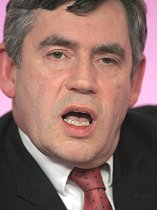2006年VOA标准英语-Britain's Brown Poised to Succeed Blair(在线收听)
By Simon Marks
London
11 October 2006
watch Brown Rise to Power
The battle to succeed Tony Blair as Britain's Prime Minister has cast the spotlight onto one of the country's most senior government ministers. Gordon Brown is Britain's Chancellor of the Exchequer - a post broadly equivalent to that of Treasury Secretary or Finance Minister in many other countries. For 10 years he has stood in the wings waiting for a chance to become Britain's prime minister, and now Mr. Blair has announced that he'll be stepping down within the next 12 months. Simon Marks in London reports.
 |
| Gordon Brown |
But in Britain itself, Brown has spent those years being overshadowed by his boss, Tony Blair. With Prime Minister Blair set to leave the stage within the next year, Brown hopes to occupy its center.
John Kampfner edits The New Statesman, a weekly news magazine supporting Brown's bid to succeed Tony Blair in the prime minister's residence, Number 10 Downing Street. "There are a lot of people in the Labour Party who believe that getting rid of Tony Blair is going to be just the beginning of a dawn of a great new era of left-wing politics," says Kampfner. "That is not going to happen. Gordon Brown will not let that happen."
He won't, says John Kampfner, because Britain has been transformed under Tony Blair's leadership, and Gordon Brown was there by his side throughout.
Their relationship has not always been friendly. London is awash with rumors of confrontational, combative meetings over the timing and manner of Mr. Blair's departure.
Brown, now energetically trying to sell himself to the British public, is promising continuity in at least one important area of policy. "We will take any necessary steps and find any necessary resources to ensure - whether in Iraq, Afghanistan or anywhere else - there is no safe haven for terrorists, and there is no hiding place for terrorist finance," says Brown.
But in Britain today, there is enormous pressure on Gordon Brown to distance himself from the United States and its "war on terror".
Anti-war protesters, and a sizeable portion of the public at large, now criticize Tony Blair for his unyielding support of the Bush administration.
They may be in for a disappointment, says John Prideaux, who covers British politics for The Economist. "He's instinctively pro-American and an Atlanticist," says Prideaux of Brown. "He's somebody who is a big admirer of the American economy and its dynamism, and somebody who likes to take his holidays in the States. And although he hasn't given very many speeches on foreign policy, people tend to infer from that that he's as pro-American as Tony Blair has been."
John Kampfner says Brown is less charismatic than Blair. "I think the one rider to that is that Gordon Brown is unlike Tony Blair, he's a very unromantic political figure," notes Kampfner. "He is not going to be drawn into any kind of 'love-in' with another political leader. He is going to be very sober, he is going to say 'what's in it for us? I don't agree with this, I don't agree with that.' But I'm sure his basic template will be pro-American".
To flesh out that template, Gordon Brown must first win the Labour Party leadership, and to his reported irritation, Tony Blair has stopped short of endorsing him for the post.
Members of Parliament, and the electorate outside it, now wait to see whether Tony Blair anoints the man who has sat next to him for a decade, or seeks to back another candidate to try and build on his legacy.